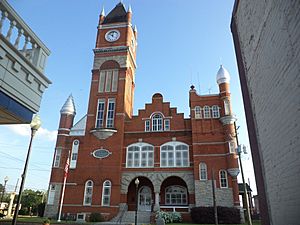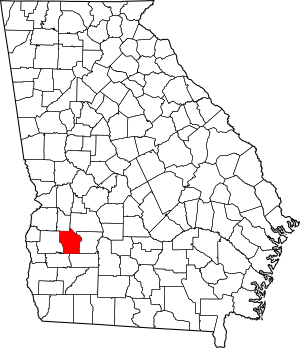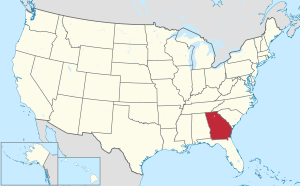Terrell County, Georgia facts for kids
Quick facts for kids
Terrell County
|
|
|---|---|

Terrell County Courthouse in Dawson
|
|

Location within the U.S. state of Georgia
|
|
 Georgia's location within the U.S. |
|
| Country | |
| State | |
| Founded | February 16, 1856 |
| Named for | William Terrell |
| Seat | Dawson |
| Largest city | Dawson |
| Area | |
| • Total | 338 sq mi (880 km2) |
| • Land | 335 sq mi (870 km2) |
| • Water | 2.3 sq mi (6 km2) 0.7%% |
| Population
(2020)
|
|
| • Total | 9,185 |
| • Density | 27/sq mi (10/km2) |
| Time zone | UTC−5 (Eastern) |
| • Summer (DST) | UTC−4 (EDT) |
| Congressional district | 2nd |
Terrell County is a county in the southwestern part of Georgia, a state in the United States. In 2020, about 9,185 people lived there. The main town and county seat is Dawson. Terrell County is part of the larger Albany area.
Contents
History of Terrell County
Terrell County was created on February 16, 1856. It was formed from parts of Randolph and Lee Counties. The county is named after Dr. William Terrell (1778–1855). He was from Sparta, Georgia. Dr. Terrell served in the Georgia General Assembly, which makes laws for Georgia. He also served in the United States House of Representatives, which makes laws for the whole country.
Terrell County During the Civil War
During the American Civil War, many people had to leave their homes. After Union forces took over Atlanta, a safe place was set up in Terrell County. This place was for people who had to escape the city. It was called Fosterville. This settlement was named after Ira Roe Foster. He was a general who managed supplies for Georgia's army. This project was a big effort by the Georgia government to help those who had lost their homes.
The Civil Rights Movement in Terrell County
In the 1960s, during the Civil Rights Movement, there was a lot of tension in Terrell County. Some local white people did not want changes to happen. Because of this, the county became known as "Terrible Terrell County."
In 1958, some African-American teachers and a college-educated Marine tried to register to vote. But they were told they could not, even though they were educated. This issue went all the way to the Supreme Court. The Court ordered the county to let them register. However, the county did not follow the order right away.
In 1960, it was shown that Black voters were given harder tests to register than white voters. Also, white people who could not read were allowed to vote. But educated Black people were wrongly told they could not read. The county said this was not unfair.
In September 1962, a church used for voter registration meetings was burned down. Prathia Hall, an African-American speaker, gave a speech at the church ruins. She used the phrase "I have a dream" many times. Rev. Martin Luther King Jr. was there and heard her speech. He later used this famous phrase in his own "I Have a Dream" speech in 1963.
Geography of Terrell County
Terrell County covers about 338 square miles. Most of this area, about 335 square miles, is land. The rest, about 2.3 square miles, is water.
The western and southern parts of Terrell County are in the Ichawaynochaway Creek area. The northeastern part is in the Kinchafoonee-Muckalee area. Both of these are part of the larger Apalachicola-Chattahoochee-Flint River Basin.
Main Roads in Terrell County
Neighboring Counties
Terrell County shares borders with these other counties:
- Webster County to the north
- Sumter County to the northeast
- Lee County to the east
- Dougherty County to the southeast
- Calhoun County to the southwest
- Randolph County to the west
Towns and Cities
Terrell County has one city and a few smaller towns.
City
Towns
Population of Terrell County
| Historical population | |||
|---|---|---|---|
| Census | Pop. | %± | |
| 1860 | 6,232 | — | |
| 1870 | 9,053 | 45.3% | |
| 1880 | 10,451 | 15.4% | |
| 1890 | 14,503 | 38.8% | |
| 1900 | 19,023 | 31.2% | |
| 1910 | 22,003 | 15.7% | |
| 1920 | 19,601 | −10.9% | |
| 1930 | 18,290 | −6.7% | |
| 1940 | 16,675 | −8.8% | |
| 1950 | 14,314 | −14.2% | |
| 1960 | 12,742 | −11.0% | |
| 1970 | 11,416 | −10.4% | |
| 1980 | 12,017 | 5.3% | |
| 1990 | 10,653 | −11.4% | |
| 2000 | 10,970 | 3.0% | |
| 2010 | 9,315 | −15.1% | |
| 2020 | 9,185 | −1.4% | |
| 2023 (est.) | 8,718 | −6.4% | |
| U.S. Decennial Census 1790-1880 1890-1910 1920-1930 1930-1940 1940-1950 1960-1980 1980-2000 2010 |
|||
People in 2020
In 2020, there were 9,185 people living in Terrell County. There were 3,399 households and 2,348 families. The table below shows the different groups of people living in the county.
| Race / Ethnicity (NH = Not Hispanic) | Pop 2000 | Pop 2010 | Pop 2020 | % 2000 | % 2010 | % 2020 |
|---|---|---|---|---|---|---|
| White alone (NH) | 4,101 | 3,366 | 3,189 | 37.38% | 36.14% | 34.72% |
| Black or African American alone (NH) | 6,614 | 5,683 | 5,540 | 60.29% | 61.01% | 60.32% |
| Native American or Alaska Native alone (NH) | 22 | 14 | 11 | 0.20% | 0.15% | 0.12% |
| Asian alone (NH) | 31 | 29 | 57 | 0.28% | 0.31% | 0.62% |
| Pacific Islander alone (NH) | 3 | 0 | 1 | 0.03% | 0.00% | 0.01% |
| Other race alone (NH) | 4 | 3 | 11 | 0.04% | 0.03% | 0.12% |
| Mixed race or Multiracial (NH) | 59 | 63 | 199 | 0.54% | 0.68% | 2.17% |
| Hispanic or Latino (any race) | 136 | 157 | 177 | 1.24% | 1.69% | 1.93% |
| Total | 10,970 | 9,315 | 9,185 | 100.00% | 100.00% | 100.00% |
Famous People from Terrell County
- Benjamin J. Davis Jr. was a lawyer who went to Harvard Law School. He was elected to the New York City Council. He helped defend a man named Angelo Herndon in Georgia. This led to a Supreme Court case that made a Georgia law unconstitutional.
- Walter Washington was an activist and politician. He was the first Black mayor of Washington, D.C..
- Otis Redding was a famous rhythm and blues singer. He was one of the first artists to be popular with both young Black and white people after World War II.
- Cole Swindell is a country music singer and songwriter. He went to Terrell Academy in Dawson, Georgia.
See also
 In Spanish: Condado de Terrell (Georgia) para niños
In Spanish: Condado de Terrell (Georgia) para niños
 | Shirley Ann Jackson |
 | Garett Morgan |
 | J. Ernest Wilkins Jr. |
 | Elijah McCoy |

